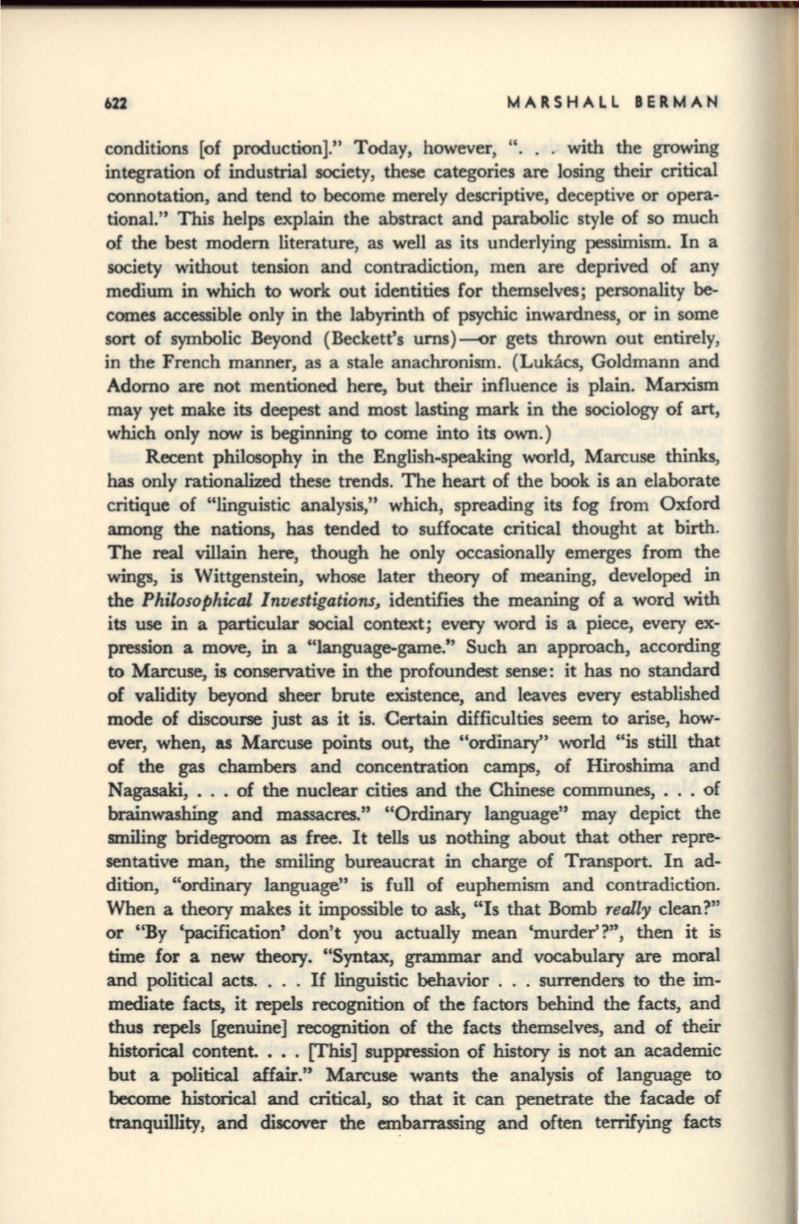

622
MARSHALL BERMAN
conditions [of production]." Today, however, "... with the growing
integration of industrial society, these categories are losing their critical
connotation, and tend to become merely descriptive, deceptive or opera–
tional." This helps explain the abstract and parabolic style of so much
of the best modem literature, as well as its underlying pessimism. In a
society without tension and contradiction, men are deprived of any
medium in which
to
work out identities for themselves; personality be–
comes accessible only in the labyrinth of psychic inwardness, or in some
sort of symbolic Beyond (Beckett's ums)-or gets thrown out entirely,
in the French manner, as a stale anachronism. (Lukacs, Goldmann and
Adorno are not mentioned here, but their influence is plain. Marxism
may yet make its deepest and most lasting mark in the sociology of
art,
which only now is beginning to come into its own.)
Recent philosophy in the English-speaking world, Marcuse thinks,
has only rationalized these trends. The heart of the book is an elaborate
critique of "linguistic analysis," which, spreading its fog from Oxford
among the nations, has tended to suffocate critical thought at birth.
The
real villain
here, though he only occasionally emerges from the
wings, is Wittgenstein, whose later theory of meaning, developed in
the
Philosophical Investigations,
identifies the meaning of a word with
its use in a particular social context; every word is a piece, every ex–
pression a move, in a "language-game." Such an approach, according
to Marcuse, is conservative in the profoundest sense: it has no standard
of validity beyond sheer brute existence, and leaves every established
mode of discourse just as it is. Certain difficulties seem
to
arise, how–
ever, when,
I1S
Marcuse points out, the "ordinary" world "is still that
of the gas chambers and concentration camps, of Hiroshima and
Nagasaki, ... of the nuclear cities and the Chinese communes, ... of
brainwashing and massacres." "Ordinary language" may depict the
smiling bridegroom as free. It tells us nothing about that other repre–
sentative man, the smiling bureaucrat in charge of Transport. In ad–
dition, "ordinary language" is full of euphemism and contradiction.
When a theory makes it impossible to ask, "Is that Bomb
really
clean?"
or "By 'pacification' don't you actually mean 'murder'?", then it is
time for a new theory. "Syntax, grammar and vocabulary are moral
and political acts....
If
linguistic behavior ... surrenders
to
the im–
mediate facts, it repels recognition of the factors behind the facts, and
thus repels [genuine] recognition of the facts themselves, and of their
historical content.... [fhis] suppression of history is not an academic
but a political affair." Marcuse wants the analysis of language to
become historical and critical, so that it can penetrate the facade of
tranquillity, and discover the embarrassing and often terrifying facts









